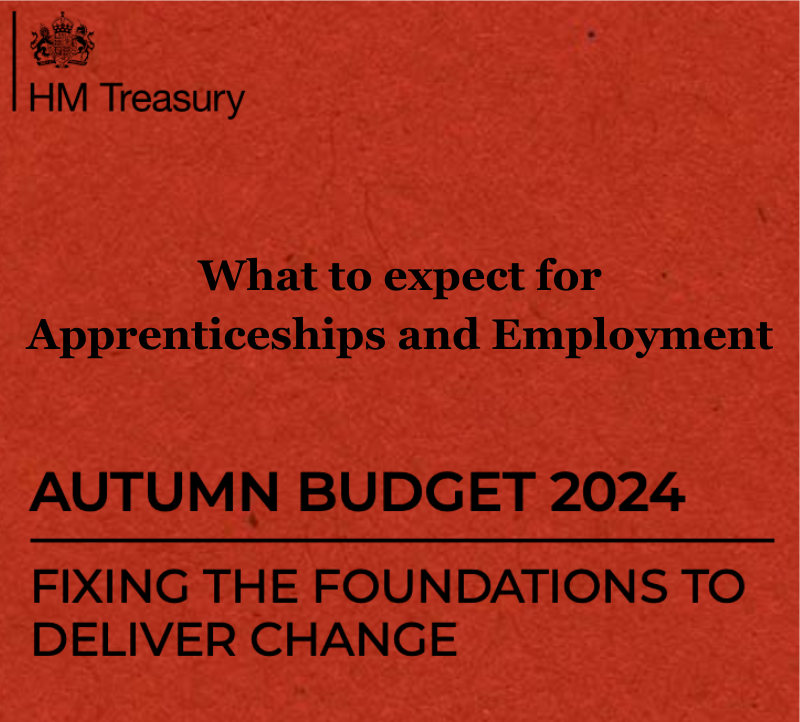
Autumn Statement 2024: Apprenticeships and Workforce Development
The UK Autumn Statement 2024, presented by Chancellor of the Exchequer Rachel Reeves, unveiled a series of initiatives aimed at stimulating economic growth and addressing critical skills shortages.
Among the standout announcements were significant updates to transform the Apprenticeship Levy into a Growth and Skills Levy through a £40 million investment, down from the £50 million budgeted in 2023.
This investment will help deliver on the commitment to launch shorter and foundation apprenticeships in key sectors.
Key Updates to Apprenticeships in the Autumn Statement
1. Shortening Apprenticeship Duration
One of the most impactful changes in the 2024 Autumn Statement is the decision to shorten the length of certain apprenticeship programmes and focus more of the budget on foundation apprenticeships in key sectors.
This initiative aims to enable quicker entry into the workforce, particularly in high-demand sectors. However, there is not yet a clear indication of how much shorter apprenticeships can be. Last year, apprenticeships in some sectors were shortened from three years to 12-18 months. Once greater detail is obtained, the hope is that these changes will make apprenticeships more attractive to potential candidates, allowing them to enter the workforce faster while still receiving comprehensive training.
The rationale behind this change is to address the urgent need for skilled workers in sectors that are critical to the UK’s economic recovery and growth. By reducing the duration of apprenticeships, the government aims to create a more agile and responsive training system that can quickly adapt to the evolving needs of the job market.
This approach not only benefits employers who require skilled labour but also provides apprentices with the opportunity to start their careers sooner, thereby reducing the financial burden associated with longer training periods.
2. Foundation Apprenticeships
In addition to shortening the duration of certain apprenticeships, the government is placing a greater emphasis on foundation apprenticeships.
These programmes are designed to provide a solid grounding in essential skills and knowledge, making them an ideal starting point for individuals who are new to a particular industry or occupation. Foundation apprenticeships are particularly beneficial for young people and those looking to change careers, as they offer a structured pathway into the workforce without the need for extensive prior experience.
The focus on foundation apprenticeships aligns with the government’s broader strategy to promote lifelong learning and continuous professional development. By providing accessible and flexible training options, the government aims to encourage more individuals to engage in skill development throughout their careers. This focus addresses both immediate skills shortages and supports the long-term goal of building a resilient and adaptable workforce.
Updates to the UK Prosperity Fund
In addition to reforms in the apprenticeship system, the 2024 Autumn Statement also announced significant updates to the UK Shared Prosperity Fund, which aims to enhance regional development and economic resilience across the country. The target for this fund was to provide £2.6 billion of investment across specific UK regions by March 2025. Last year, £1.5 billion was budgeted for the fund, but this year, that budget has taken a £6 million cut.
- Continuing the UK Shared Prosperity Fund: £900 million will be allocated to continue the UK Shared Prosperity Fund at a reduced level for another year. This transitional arrangement will allow local authorities to invest in local growth ahead of wider funding reforms, ensuring that communities have the resources needed to address their unique challenges.
- Empowerment of Local Authorities: The updated fund will give local authorities greater discretion in how they allocate resources. This allows for a more tailored approach to development, enabling communities to address their unique challenges and priorities effectively.
The continuation of the UK Shared Prosperity Fund is a critical component of the government’s strategy to support regional economic development. By providing targeted funding to local authorities, local communities can feel empowered to take control of their own economic futures.
Additional Funding and Policy Changes
The 2024 Autumn Statement also included several important allocations and initiatives to further support education and employment:
- £300 million to Further Education: This funding is aimed at enhancing educational opportunities and supporting institutions across the UK. The additional investment will be used to improve facilities, expand course offerings, and increase access to high-quality training programs. By strengthening the further education sector, the government aims to provide more individuals with the skills and qualifications needed to succeed in the modern economy.
- Integrated Settlement Innovators Accelerator Programme: Greater Manchester, alongside the West Midlands, will be the first regions to receive support through this program, aimed at fostering innovation and local growth. The program will provide funding and resources to help local authorities develop and implement innovative solutions to economic and social challenges. By supporting regional innovation, the government hopes to drive economic growth and improve quality of life in communities across the UK.
- £6.7 billion Capital Investment for the Department for Education: This significant investment, a real terms increase of 19% from 2024-25, will support various educational initiatives and infrastructure improvements. The funding will be used to build new schools, upgrade existing facilities, and enhance educational resources. By investing in education infrastructure, the government aims to create a learning environment that supports student success and prepares the next generation for the challenges of the future.
National Minimum Wage Changes
The statement also included updates to the National Minimum Wage:
- National Living Wage: The minimum wage for over 21s, known officially as the National Living Wage, will rise by 6.7%, from £11.44 to £12.21 from April 2025. This increase is part of the government’s ongoing efforts to ensure that all workers receive fair compensation for their labor. By raising the National Living Wage, the government aims to improve the standard of living for millions of low-wage workers across the UK.
- Minimum Wage for 18 to 20-year-olds: The minimum wage for this age group will increase from £8.60 to £10. This substantial increase reflects the government’s commitment to supporting young workers and ensuring that they receive fair pay for their contributions to the economy. By aligning the minimum wage for young adults more closely with the National Living Wage, the government aims to reduce income inequality and promote economic inclusion.
Promoting Equality, Diversity, and Inclusion
A significant aspect of the 2024 Autumn Statement is its emphasis on promoting equality, diversity, and inclusion (EDI) within the workforce. At Instep we strongly believe that a diverse and inclusive workforce is not only fairer but also more innovative and productive. Here, we can see that several initiatives in the Autumn Statement are designed to support EDI goals:
- Inclusive Apprenticeships: The focus on foundation apprenticeships includes efforts to make these programs more accessible to underrepresented groups. By providing targeted support and removing barriers to entry, the government aims to ensure that apprenticeships are an option for everyone, regardless of their background.
- Support for Women in Leadership: The government is continuing its support for programs that promote gender equality in the workplace. This includes funding for initiatives that help women develop leadership skills and advance their careers. By investing in the potential of women, the government aims to create a more balanced and equitable workforce.
- Diversity in Regional Development: The UK Shared Prosperity Fund includes provisions to support projects that promote diversity and inclusion at the local level. By empowering local authorities to address the specific needs of their communities, the government aims to create more inclusive economic growth.
The Importance of These Changes
These updates to the apprenticeship system and the UK Shared Prosperity Fund are crucial for several reasons:
- Addressing Skills Shortages: By shortening training times and enhancing funding, the government aims to quickly address critical skills gaps in sectors vital for the UK’s economic recovery and growth. The focus on foundation apprenticeships and targeted regional investments will help to ensure that the workforce is equipped with the skills needed to meet the demands of the modern economy.
- Supporting Economic Growth: A skilled workforce is essential for driving innovation and productivity. These apprenticeship reforms, combined with the Prosperity Fund’s support, are expected to contribute to the overall economic resilience of the UK. By investing in education and training, the government aims to create a more dynamic and competitive economy that can adapt to changing global conditions.
- Encouraging Lifelong Learning: The flexibility and accessibility of apprenticeships, alongside targeted regional investments, will encourage more individuals to engage in lifelong learning and skill development, aligning their careers with evolving job market demands. By promoting continuous professional development, the government aims to create a culture of learning that supports individual career growth and economic prosperity.
Conclusion
The 2024 Autumn Statement reflects a proactive approach to skills development through significant updates to the apprenticeship system and continuation of the UK Shared Prosperity Fund. By shortening programme durations, enhancing funding, and providing greater flexibility for employers, the government aims to create a robust framework that meets the needs of both businesses and individuals. As the UK continues to navigate economic challenges, these changes are a crucial step toward building a skilled workforce ready to meet the demands of the future.
As these reforms take shape, it will be interesting to see how they influence apprenticeship uptake and overall workforce development in the coming years. We hope the government’s commitment to supporting education and training, combined with targeted regional investments, provides a strong foundation for economic growth and resilience.
We believe that, by supporting a culture of lifelong learning and promoting economic inclusion, the UK will be well-positioned to build a prosperous and sustainable future.


